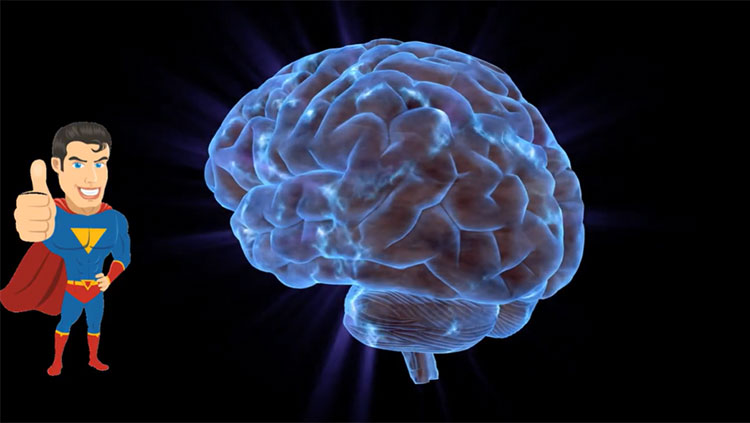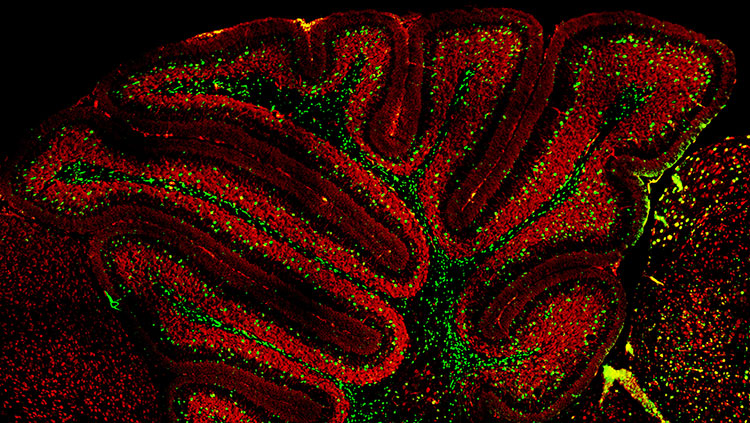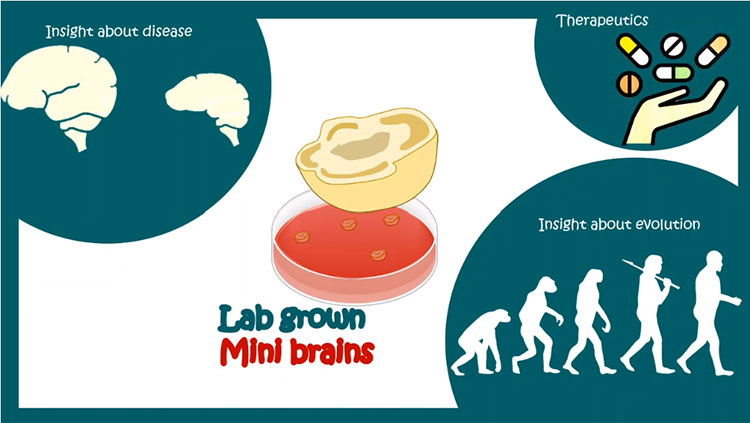Inflammation During Pregnancy Can Alter Babies’ Neurodevelopment
- Published22 Oct 2024
- Author Ailie McWhinnie
- Source BrainFacts/SfN

Infection, chronic stress, and substance use can all trigger inflammation. This takes a toll on the body, but during pregnancy, it brings an additional risk. Elevated inflammation can impact a maturing fetus, increasing its risk of neurodevelopmental and psychiatric disorders. Why, or how, is less clear.
Preliminary research presented at Neuroscience 2024, the Society for Neuroscience’s annual meeting, in Chicago, reveals mechanisms for how drug-induced maternal inflammation disrupts brain development in early stages of pregnancy. Other research indicates male fetuses may be more vulnerable to inflammation-induced developmental deficits, perhaps helping to explain the male bias in many neurodevelopmental disorders.
Cocaine-Induced Inflammation Hinders Development in Human Organoids
Cocaine consumption continues to rise, with more than 40 million US adults having used the drug. Drugs, including cocaine, can cross the placenta — meaning if a pregnant mother uses cocaine, it enters the developing baby’s bloodstream. Scientists know this has lifelong impacts on the developing baby, including developmental delays, cognitive impairments, and an increased risk of psychiatric disorders.
Now, stem cell technologies are allowing neuroscientists to look at something close to the human brain in the lab to study how cocaine disrupts development. Keith Murphy, a neuroscientist at University College Dublin, and his team generated cerebral organoids from human stem cells to better study the impact of cocaine on development.
Organoids begin life as unspecified stem cells in a dish, and with the application of the right chemical signals, they multiply and become brain cells, progressively arranging into a 3D structure. This process closely mimics early human brain development and gives rise to the same layered structure of a real brain — just on a miniature scale.
“This platform [stem cell-derived organoids] can be used to identify and develop potential new drug treatments that can reverse the effect of cocaine on the developing brain,” comments Murphy. “And actually, in theory, drugs developed that way might also be useful for treating drug addiction in the adult brain.”
The researchers exposed cerebral organoids to cocaine then examined the gene expression of individual cells. They found many had failed to develop into neurons, causing a reduction in the overall number of neurons in the model brain.
Further investigation revealed epigenetic changes in these cells — modifications to the DNA structure that influence gene expression — prevented the usual activation of genes responsible for neuron development. Analysis of the astrocytes, a type of brain immune cell, showed they were promoting inflammation. Inflammation puts nearby cells under stress, so scientists think this disrupted the immature brain cells’ usual pattern of gene expression, preventing them from fully developing.
These results suggest babies exposed to cocaine in the womb develop fewer neurons as a result of brain inflammation during their development. Neurodevelopmental disorders like autism are associated with an imbalance in neuron numbers and connections, so this finding may help explain their increased risk following maternal cocaine use in pregnancy.
Maternal Inflammation, Like in Viral Infection, Can Disrupt Male Brain Development
But it’s not just drug use that can cause inflammation — common infections also trigger it. Pregnant mothers are advised to protect themselves from viral infections like flu because the associated inflammation is known to increase the risk of neurodevelopmental disorders like schizophrenia and autism.
“Especially after big pandemics, we have a big incidence of neurodevelopmental disorders,” says Irene Sanchez-Martin, a researcher at Cold Spring Harbor Laboratory. These disorders show a striking sex difference, with more males being diagnosed than females. This led Sanchez-Martin and her team to question whether male fetuses might be more vulnerable to maternal inflammation, which could help explain the bias in diagnoses.
To investigate, the team injected mice with an immunostimulant, producing the same reaction as a viral infection. This procedure is known to increase autism-like behavior in offspring but instead of waiting until birth to see these effects, they examined the mouse fetuses just one or two days after triggering inflammation to see how quickly development was altered.
They discovered female pups were all unaffected, but half of the males showed impairments. Analysis of the placenta and amniotic fluid indicated elevated inflammation and alterations to the circulatory system, suggesting disruptions in those support tissues may be driving the developmental changes very quickly after inflammation begins.
Catching viral infections like the flu does not match the risk of using cocaine during pregnancy, but by studying diverse types of inflammation, scientists can identify common mechanisms by which inflammation in a pregnant mother can disrupt their baby’s development. Scientists hope this knowledge could one day inform therapies to counter the effects, but also highlight the importance of public health initiatives like free vaccinations for pregnant mothers, which reduce their chance of inflammation.
CONTENT PROVIDED BY
BrainFacts/SfN
What to Read Next
Also In Brain Development
Trending
Popular articles on BrainFacts.org



















